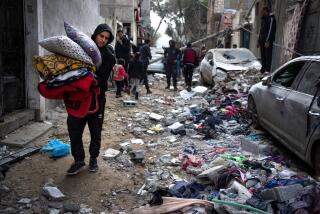Long-Suffering Iraqis Face Only More Agony
- Share via
The American and Iraqi governments have entered the final stages of bluffing, blustering and threatening. Soon, it seems, the shooting and the bombing will begin.
In all this cacophony, there’s one voice missing: that of the Iraqi people, who have been suffering for decades from repression, war and sanctions, who will suffer the most when the war actually begins and who are likely to feel the aftereffects of the war for many years to come.
The people of Iraq are Saddam Hussein’s victims, not his accomplices. But they will bear the brunt of war -- again.
Most Americans remember the Gulf War as relatively bloodless. Actually, some 3,000 Iraqi civilians were killed directly in allied attacks.
Many Americans worry that war in Iraq will make U.S. citizens more vulnerable to retaliatory terrorist attacks. But obviously Iraqi civilians are in much greater danger, and will suffer far more, than American citizens as a result of this war.
The Department of Defense recently unveiled a “shock and awe” bombing strategy that could be cause for real concern if, in its eagerness to obliterate military targets, the appropriate concern for civilian casualties falls by the wayside.
According to humanitarian groups, about 110,000 Iraqis died in 1991 as a result of U.S. airstrikes against electrical grids, generating plants and other infrastructure. The lack of refrigeration, water purification and sewage treatment had catastrophic effects on public health, with increases in cholera, typhoid and other diseases.
Under the sanctions regime imposed by the United Nations after the war, a rich country became poor: Infant and child mortality shot up, life expectancy dropped and humanitarian agencies report that at least one out of five children in south and central Iraq suffers from chronic malnutrition.
The country’s economy has collapsed. More than 60% of Iraqis get virtually all their food through government-distributed rations of flour, rice, tea, cooking oil, beans and other commodities.
Since 1991, nearly 1 million Iraqis have become displaced people inside the country’s borders. According to U.N. estimates, as many as 2 million more could be on the move after hostilities begin. Where will they go? Iraq’s neighbors have threatened to close their borders to refugees.
The people of Iraq have suffered mightily under the totalitarian Hussein government, with its secret police, complete lack of basic political freedoms and many varieties of torture.
The decades of extraordinary hardship have allowed the Bush administration to argue that the Iraqi people, no matter how much they suffer during the war, will emerge from it better off. Such hypothetical trade-offs are genuinely difficult to measure. But it’s easy to measure the disastrous lack of planning for the humanitarian crisis we can all see coming.
Will the U.S. military be ready and able to provide general security in southern Iraq so that aid groups can operate safely? Will it be patrolling the streets of Basra and Kirkuk to prevent looting, revenge killing and chaos? Will it be ready to provide direct services to displaced people who cross the path of advancing U.S. troops before aid groups can arrive on the scene?
Will it be ready to aid Iraqi victims of, say, a chemical weapons attack by Hussein -- or will American soldiers be driving toward Baghdad in full protective gear while Iraqi civilians die gruesome deaths by the side of the road?
The only announced answer to these questions is that the Pentagon is deploying a 60-person civilian “disaster assistance response team.” Deputy National Security Advisor Steve Hadley boasted last week that this was the largest such deployment in U.S. history. Given the area of operations and the potential scope of humanitarian problems, this gesture is, in fact, absurdly inadequate.
Perhaps the greatest danger to Iraqi civilians is the destruction that Hussein may wreak upon his own people once he’s attacked. U.S. allies among the Kurds and the Shiites could also do a great deal of harm.
Yet once the U.S. gains control over even a part of the country, it will become an occupying authority with full legal and moral responsibilities for the welfare of the Iraqi people. It will have to answer for their suffering.
Maybe then the Bush administration will start seeing the war from their perspective -- although for many Iraqis, it will be too late.
More to Read
Sign up for Essential California
The most important California stories and recommendations in your inbox every morning.
You may occasionally receive promotional content from the Los Angeles Times.













